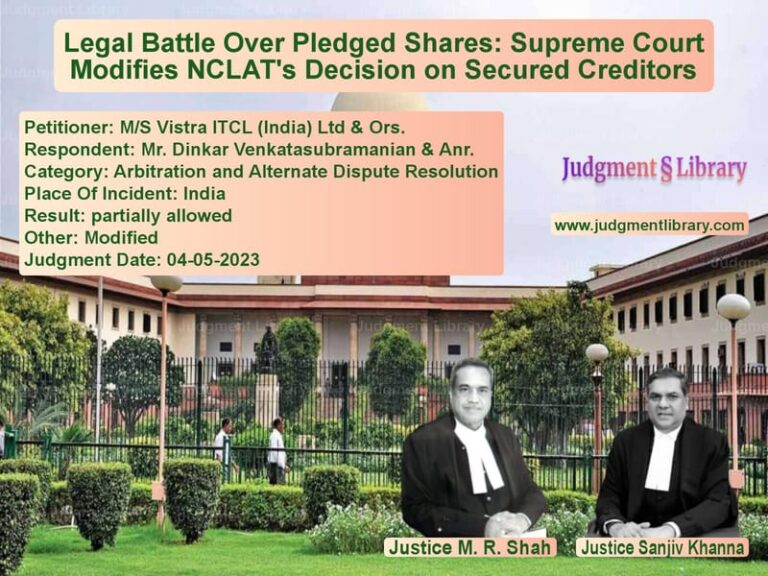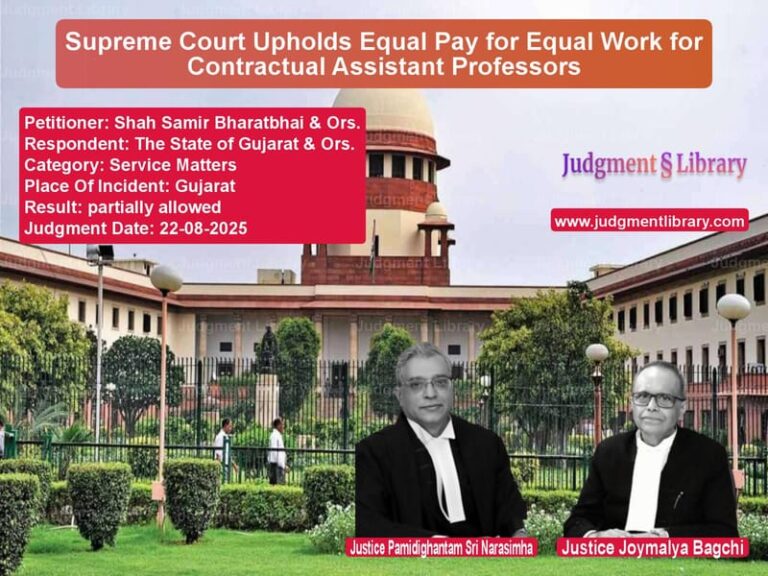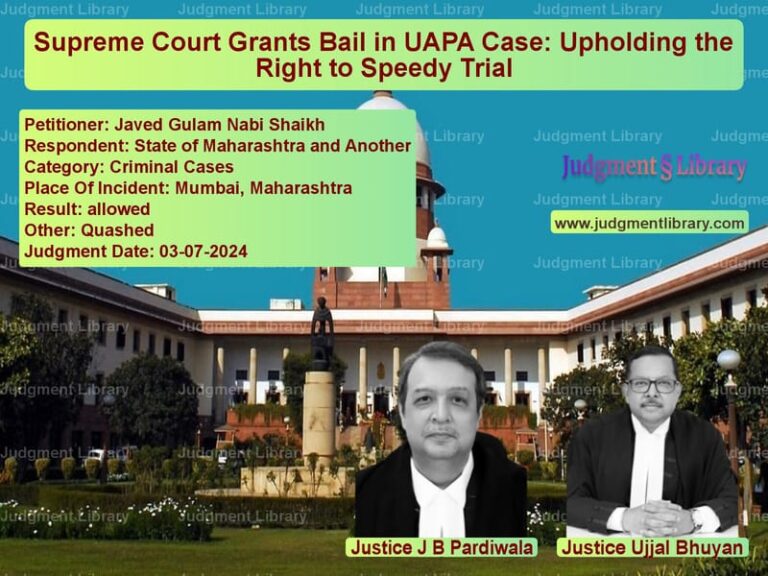Maharashtra Educational Institutions Not Exempt from Electricity Duty: Supreme Court Verdict
The case of State of Maharashtra vs. Shri Vile Parle Kelvani Mandal & Others is a significant ruling concerning the exemption of charitable educational institutions from electricity duty under the Maharashtra Electricity Duty Act, 2016. The Supreme Court set aside the Bombay High Court’s ruling, which had earlier held that such institutions were exempt from paying electricity duty.
Background of the Case
The dispute arose when the State of Maharashtra imposed electricity duty on charitable educational institutions run by the respondent, Shri Vile Parle Kelvani Mandal, a society registered under the Societies Registration Act, 1860, and a public charitable trust under the Maharashtra Public Trusts Act, 1950. These institutions had been exempted from electricity duty before September 1, 2016, under Section 3(2)(iii) of the Maharashtra Electricity Duty Act, 1958.
However, after the enactment of the Maharashtra Electricity Duty Act, 2016, the government issued a directive stating that charitable educational institutions were no longer entitled to electricity duty exemption. Electricity supply companies levied electricity duty at 21% and raised bills accordingly. Aggrieved by this, the respondent filed a writ petition before the Bombay High Court, which ruled in their favor and set aside the levy of electricity duty.
Arguments of the Petitioner (State of Maharashtra)
The State of Maharashtra challenged the High Court’s ruling on the following grounds:
- Change in Legal Framework: The 2016 Act repealed the 1958 Act, removing the electricity duty exemption for charitable educational institutions.
- Absence of Legal Challenge: The High Court set aside the levy of electricity duty without the respondents challenging the validity of the 2016 Act.
- Strict Interpretation of Exemptions: Exemptions in taxation statutes should be strictly construed, and the 2016 Act deliberately excluded charitable educational institutions from the exemption list.
- Revenue Implications: Allowing the exemption would result in significant revenue loss for the state.
Arguments of the Respondents (Educational Institutions)
The respondents, through their counsel, argued:
- Presumption Against Radical Changes: The legislature does not make radical changes without explicit intent, and the exemption should continue as in the previous law.
- Literal Interpretation Leads to Absurdity: If only educational institutions run by local bodies are exempted, private and charitable institutions would face discrimination.
- Principle of Equality Under Article 14: Denying exemption to charitable institutions while allowing it for government-run schools violates the right to equality.
- Intent of the Legislature: The purpose of the exemption was to promote education, and removing it contradicts the public interest.
Supreme Court’s Observations
The Supreme Court, led by Justices M.R. Shah and Sanjiv Khanna, made the following key observations:
- Clear Legislative Intent: The 2016 Act does not provide any exemption for charitable educational institutions, which were explicitly covered under the 1958 Act.
- Strict Construction of Tax Exemptions: Citing previous rulings, the Court reaffirmed that tax exemptions must be interpreted strictly and cannot be implied.
- Absence of Exemption in 2016 Act: The Court noted that if the legislature had intended to continue the exemption, it would have included a provision similar to the 1958 Act.
- Judicial Overreach: The High Court erred in granting an exemption where none existed under the law.
Final Judgment
The Supreme Court set aside the High Court’s order and held that charitable educational institutions are not entitled to electricity duty exemption under the Maharashtra Electricity Duty Act, 2016. The judgment stated:
“The original writ petitioners – charitable education institutions registered under the Societies Registration Act and the Maharashtra Public Trusts Act – are not exempt from levy/payment of electricity duty on or after 08.08.2016, when the Maharashtra Electricity Duty Act, 2016 came into effect.”
Implications of the Judgment
This ruling has several important implications:
- Clarification on Tax Exemptions: It reaffirms that exemptions in taxation statutes cannot be assumed and must be explicitly stated.
- Ensuring Revenue Generation: The judgment prevents revenue losses that could arise from unwarranted tax exemptions.
- Upholding Legislative Intent: The ruling confirms that courts should not grant exemptions beyond what is provided in the statute.
- Potential Policy Reforms: Educational institutions may lobby the legislature to amend the law and reinstate the exemption.
With this decision, the Supreme Court has reinforced the principle that taxation laws must be interpreted strictly and that exemptions must be expressly provided for in the statute.
Petitioner Name: State of Maharashtra.Respondent Name: Shri Vile Parle Kelvani Mandal & Others.Judgment By: Justice M.R. Shah, Justice Sanjiv Khanna.Place Of Incident: Maharashtra.Judgment Date: 07-01-2022.
Don’t miss out on the full details! Download the complete judgment in PDF format below and gain valuable insights instantly!
Download Judgment: state-of-maharashtra-vs-shri-vile-parle-kelv-supreme-court-of-india-judgment-dated-07-01-2022.pdf
Directly Download Judgment: Directly download this Judgment
See all petitions in Tax Refund Disputes
See all petitions in Banking Regulations
See all petitions in Income Tax Disputes
See all petitions in Judgment by Mukeshkumar Rasikbhai Shah
See all petitions in Judgment by Sanjiv Khanna
See all petitions in allowed
See all petitions in Quashed
See all petitions in supreme court of India judgments January 2022
See all petitions in 2022 judgments
See all posts in Taxation and Financial Cases Category
See all allowed petitions in Taxation and Financial Cases Category
See all Dismissed petitions in Taxation and Financial Cases Category
See all partially allowed petitions in Taxation and Financial Cases Category







